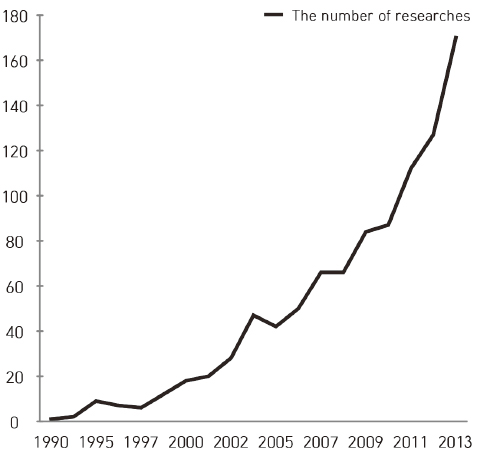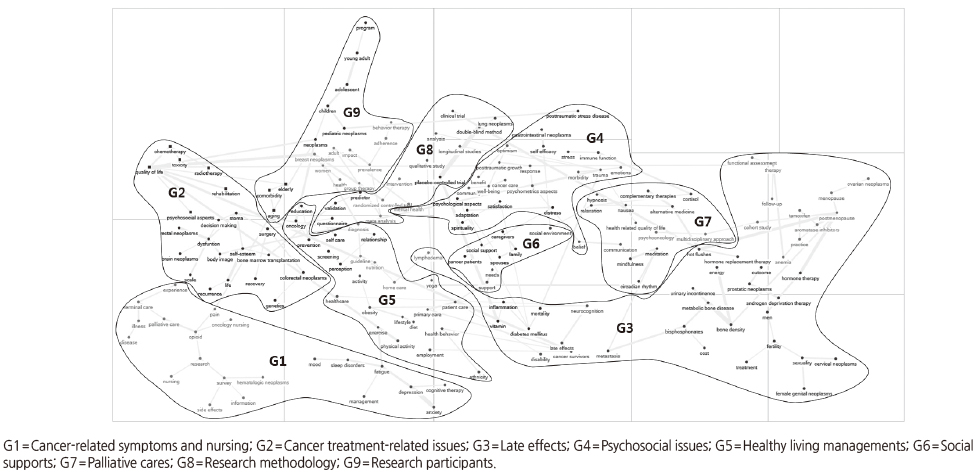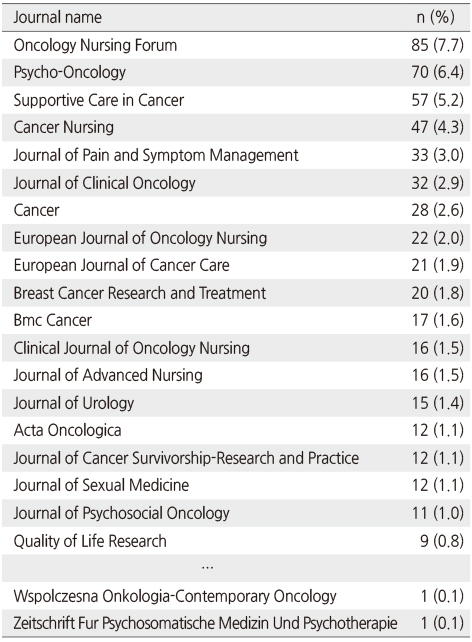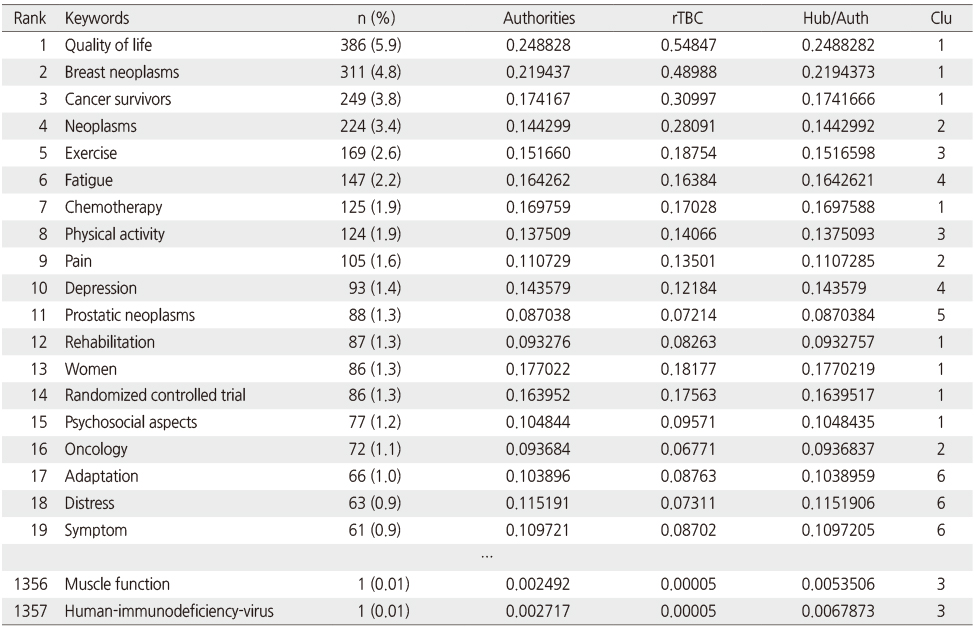Articles
- Page Path
- HOME > J Korean Acad Nurs > Volume 46(1); 2016 > Article
-
Original Article
- A Study on the Knowledge Structure of Cancer Survivors based on Social Network Analysis
- Sun Young Kwon, Ka Ryeong Bae
-
Journal of Korean Academy of Nursing 2016;46(1):50-58.
DOI: https://doi.org/10.4040/jkan.2016.46.1.50
Published online: February 29, 2016
1Knowledge Management Institute, Sungkyunkwan University, Seoul, Korea.
2College of Nursing, Yonsei University, Seoul, Korea.
- Address reprint requests to: Bae, Ka Ryeong. College of Nursing, Yonsei University, 50-1 Yonsei-ro, Seodaemun-gu, Seoul 03722, Korea. Tel: +82-10-6652-8385, Fax: +82-2-392-5440, baekr8385@naver.com
• Received: June 10, 2015 • Revised: June 23, 2015 • Accepted: October 9, 2015
© 2016 Korean Society of Nursing Science
This is an Open Access article distributed under the terms of the Creative Commons Attribution NoDerivs License. (http://creativecommons.org/licenses/by-nd/4.0/) If the original work is properly cited and retained without any modification or reproduction, it can be used and re-distributed in any format and medium.
Abstract
-
Purpose
- The purpose of this study was to identify the knowledge structure of cancer survivors.
-
Methods
- For data, 1099 articles were collected, with 365 keywords as a Noun phrase extracted from the articles and standardized for analyzing. Co-occurrence matrix were generated via a cosine similarity measure, and then the network analysis and visualization using PFNet and NodeXL were applied to visualize intellectual interchanges among keywords.
-
Results
- According to the result of the content analysis and the cluster analysis of author keywords from cancer survivors articles, keywords such as 'quality of life', 'breast neoplasms', 'cancer survivors', 'neoplasms', 'exercise' had a high degree centrality. The 9 most important research topics concerning cancer survivors were 'cancer-related symptoms and nursing', 'cancer treatment-related issues', 'late effects', 'psychosocial issues', 'healthy living managements', 'social supports', 'palliative cares', 'research methodology', and 'research participants'.
-
Conclusion
- Through this study, the knowledge structure of cancer survivors was identified. The 9 topics identified in this study can provide useful research direction for the development of nursing in cancer survivor research areas. The Network analysis used in this study will be useful for identifying the knowledge structure and identifying general views and current cancer survivor research trends.
- 1. Jung KW, Won YJ, Kong HJ, Oh CM, Cho H, Lee DH, et al. Cancer statistics in Korea: Incidence, mortality, survival, and prevalence in 2012. Cancer Res Treat. 2015;47(2):127–141. ArticlePubMedPMCPDF
- 2. Seo HG, Park JH. Cancer survivorship. Goyang: National Cancer Center; 2013.
- 3. Lee JE, Shin DW, Cho BL. The current status of cancer survivorship care and a consideration of appropriate care model in Korea. Korean J Clin Oncol. 2014;10(2):58–62. Article
- 4. Kim SH. Understanding cancer survivorship and its new perspectives. J Korean Oncol Nurs. 2010;10(1):19–29.
- 5. Molassiotis A, Gibson F, Kelly D, Richardson A, Dabbour R, Ahmad AM, et al. A systematic review of worldwide cancer nursing research: 1994 to 2003. Cancer Nurs. 2006;29(6):431–440. PubMed
- 6. López-Illescas C, de Moya-Anegó F, Moed HF. The actual citation impact of European oncological research. Eur J Cancer. 2008;44(2):228–236. ArticlePubMed
- 7. Lim SO, Hong EY. An integrative review and meta-analysis of oncology nursing research: 1985-1997.2. J Nurs Acad Soc. 1997;27(4):857–870.ArticlePDF
- 8. Choi SH, Nam YH, Ryu EJ, Baek MW, Suh DH, Suh SR, et al. An integrative review of oncology nursing research: 1980-1998. J Korean Acad Nurs. 1998;28(3):786–800.ArticlePDF
- 9. Oh PJ. An integrative review of oncology nursing research In Korea:1998-2003. J Korean Oncol Nurs. 2003;3(2):112–121.
- 10. Oh PJ. An integrative review of oncology nursing research in Korea: 2003-2008. J Korean Oncol Nurs. 2010;10(1):80–87.
- 11. Lee EH, Park HB, Kim MW, Kang S, Lee HJ, Lee WH, et al. Analyses of the studies on cancer-related quality of life published in Korea. J Korean Soc Ther Radiol Oncol. 2002;20(4):359–366.
- 12. Hong MS, Yom YH, Kim GM. The analysis of trends and contents of nursing intervention research for cancer patients in Korea. Asian Oncol Nurs. 2012;12(4):247–256. ArticlePDF
- 13. Sohn SK, Han YI, Kim KH, Youn SJ. Analysis of cancer nursing research in digestive system in Korea. J Korean Oncol Nurs. 2005;5(1):52–62.
- 14. Choi KS, Kim MS, Lee IJ, Han SY, Park JA, Lee J. Analysis of nursing intervention studies on patients with breast cancer in Korea. J Korean Oncol Nurs. 2011;11(1):74–82. ArticlePDF
- 15. Kim H, Ban JY, Yoon JY, Na YH, Jeon JY, Yeo SM, et al. Analysis of research on the nursing of hematology in Korea. J Korean Oncol Nurs. 2010;10(2):146–155. ArticlePDF
- 16. Small H. Visualizing science by citation mapping. J Am Soc Inf Sci. 1999;50(9):799–813. Article
- 17. He Q. Knowledge discovery through co-word analysis. Libr Trends. 1999;48(1):133–159.
- 18. Kwon SY. A study on the factors influencing semantic relation in building a structured glossary. J Korean Libr Inf Sci Soc. 2014;48(2):353–378. Article
- 19. Sohn DK. General and analysis of the research network for colorectal neoplasms [dissertation]. Cheongju, Chungbuk National University. 2011.
- 20. Jang HL, Kang GW, Lee EJ, Kim SR, Lee YS. Analysis of research subject network in the field of oncogene. J Korea Technol Innov Soc. 2012;15(2):369–399.
- 21. Lee HS. The social network analysis for research of the cancer patients' health-related quality of life [dissertation]. Seoul, Chung-Ang University. 2014.
- 22. Chung BY, Yi MS, Choi EH. Trends of nursing research in the journal of oncology nursing. J Korean Oncol Nurs. 2008;8(1):61–66.
- 23. Kim SJ, Kim KB, Yi MS, Lee KJ, Ahn YH, Kim HS, et al. The trends of nursing research in the journals of seven branches of the Korean academy of nursing. J Korean Acad Nurs. 2002;32(1):114–130.ArticlePDF
- 24. Bae YM, Kim YA, Hong SH, Koo JH, Yun YH. Public attitudes toward development of national program for cancer survivorship. Korean J Hosp Palliat Care. 2011;14(4):218–226.Article
- 25. Korean Breast Cancer Society. Breast cancer facts & figures 2014. Seoul: Author; 2014.
- 26. Byun HS, Park HJ, Kim JY. A conceptual analysis of cancer survivorship. Asian Oncol Nurs. 2012;12(3):237–245. ArticlePDF
- 27. Hahm BJ, Shim EJ, Kim HK, Kim JH. History and current status of psycho-oncology. J Korean Neuropsychiatr Assoc. 2007;46(5):413–420.
- 28. Jacobsen PB, Jim HS. Psychosocial interventions for anxiety and depression in adult cancer patients: Achievements and challenges. CA Cancer J Clin. 2008;58(4):214–230. ArticlePubMed
- 29. Lee IJ. A systematic review of posttraumatic growth in cancer. Soc Work Pract Res. 2009;6:81–113.
REFERENCES
Figure & Data
REFERENCES
Citations
Citations to this article as recorded by 

- Effectiveness of Self-Assessment, TAilored Information, and Lifestyle Management for Cancer Patients’ Returning to Work (START): A Multi-center, Randomized Controlled Trial
Danbee Kang, Ka Ryeong Bae, Yeojin Ahn, Nayeon Kim, Seok Jin Nam, Jeong Eon Lee, Se Kyung Lee, Young Mog Shim, Dong Hyun Sinn, Seung Yeop Oh, Mison Chun, Jaesung Heo, Juhee Cho
Cancer Research and Treatment.2023; 55(2): 419. CrossRef - Web-Based Research Trends on Child and Adolescent Cancer Survivors Over the Last 5 Years: Text Network Analysis and Topic Modeling Study
Hyun-Yong Kim, Kyung-Ah Kang, Suk-Jung Han, Jiyoung Chun
Journal of Medical Internet Research.2022; 24(2): e32309. CrossRef - Network analysis based on big data in social media of Korean adolescents’ diet behaviors
JongHwi Song, SooYeun Yoo, JunRyul Yang, SangKyun Yun, YunHee Shin, Girish C. Melkani
PLOS ONE.2022; 17(8): e0273570. CrossRef - An Overview of Cognitive Reserve in Aging Based on Keyword Network Analysis
Jihyun Kim, Mi So Kim
INQUIRY: The Journal of Health Care Organization, Provision, and Financing.2022;[Epub] CrossRef - Analysis of research on metabolic syndrome in cancer survivors using topic modeling and social network analysis
Ji-Su Kim, Hyejin Kim, Eunkyung Lee, Yeji Seo
Science Progress.2021;[Epub] CrossRef - An Identification of the Knowledge Structure on the Resilience of Caregivers of People with Dementia using a Text Network Analysis
Eun Young Kim, Sung Ok Chang
Journal of Korean Gerontological Nursing.2021; 23(1): 66. CrossRef - Research Topics and Trends in Interprofessional Education in Nursing
Kisook Kim, Ki-Seong Lee
CIN: Computers, Informatics, Nursing.2021; 39(10): 554. CrossRef - Social Determinants of Health of Multicultural Adolescents in South Korea: An Integrated Literature Review (2018~2020)
Youlim Kim, Hyeonkyeong Lee, Hyeyeon Lee, Mikyung Lee, Sookyung Kim, Kennedy Diema Konlan
Journal of Korean Academy of Community Health Nursing.2021; 32(4): 430. CrossRef - A Network Analysis of Research Topics and Trends in End-of-Life Care and Nursing
Kisook Kim, Seung Gyeong Jang, Ki-Seong Lee
International Journal of Environmental Research and Public Health.2021; 18(1): 313. CrossRef - Research Trends on Factors Influencing the Quality of Life of Cancer Survivors: Text Network Analysis and Topic Modeling Approach
Jin-Hee Park, Mison Chun, Sun Hyoung Bae, Hee-Jun Kim
Asian Oncology Nursing.2021; 21(4): 231. CrossRef - Knowledge Structure of Nursing Studies on Heart Failure Patients in South Korea through Text Network Analysis
Seang Ryu, Hyunyoung Park, Yun-Hee Kim
Korean Journal of Adult Nursing.2020; 32(4): 409. CrossRef - Semantic Network Analysis of Iussues Related to Mental Illness in Korea Media: Focusing on the Five Major Media from 2016 to 2018
Sun Joo Park, Na Ri Shin, Seung Hye Kim, Su Bin Park, Chul Eung Kim
Journal of Korean Neuropsychiatric Association.2020; 59(1): 72. CrossRef - Identification of the Knowledge Structure of Cancer Survivors’ Return to Work and Quality of Life: A Text Network Analysis
Kisook Kim, Ki-Seong Lee
International Journal of Environmental Research and Public Health.2020; 17(24): 9368. CrossRef - Using Text Network Analysis for Analyzing Academic Papers in Nursing
Chan Sook Park
Perspectives in Nursing Science.2019; 16(1): 12. CrossRef - Identification of Knowledge Structure of Pain Management Nursing Research Applying Text Network Analysis
Chan Sook Park, Eun-Jun Park
Journal of Korean Academy of Nursing.2019; 49(5): 538. CrossRef - Exploring the Knowledge Structure of Nursing Care for Older Patients With Delirium
Jung Eun Choi, Mi So Kim
CIN: Computers, Informatics, Nursing.2018; 36(5): 216. CrossRef - A Comparison of Hospice Care Research Topics between Korea and Other Countries Using Text Network Analysis
Eun-Jun Park, Youngji Kim, Chan Sook Park
Journal of Korean Academy of Nursing.2017; 47(5): 600. CrossRef - The Network Analysis of Nursing Diagnoses for Children Admitted in Pediatric Units Determined by Nursing Students
Mikyung Moon
Journal of Health Informatics and Statistics.2017; 42(3): 223. CrossRef - Analysis of Research Articles Published in the Journal of Korean Academy of Nursing Administration for 3 Years (2013~2015): The Application of Text Network Analysis
Tae Wha Lee, Kwang-Ok Park, GyeongAe Seomun, Miyoung Kim, Jee-In Hwang, Soyoung Yu, Seok Hee Jeong, Min Jung, Mikyung Moon
Journal of Korean Academy of Nursing Administration.2017; 23(1): 101. CrossRef - Social Network Analysis on Mapping the Knowledge Structure of Dementia Research
Jung-Hee Han, Young-Hee Yom
Journal of Korean Gerontological Nursing.2017; 19(2): 69. CrossRef
A Study on the Knowledge Structure of Cancer Survivors based on Social Network Analysis


Figure 1
Change in the number of researches for cancer survivors by year.
Figure 2
The PFnet(q=n-1, r=∞) visualization of the 365 node co-occurrence network.
Figure 1
Figure 2
A Study on the Knowledge Structure of Cancer Survivors based on Social Network Analysis
Search Queries and Results on Web of Science
Research Journals and Articles about 6 Facets and Queries on Web of Science (N=1,099)
Frequencies of Keywords in 1099 Cancer Survivors Researches (N=6,543)
rTBC=Triangle betweeness centrality (normalized); Hub/Auth=Hub & authorities; Clu=Cluster.
Table 1
Search Queries and Results on Web of Science
Table 2
Research Journals and Articles about 6 Facets and Queries on Web of Science (N=1,099)
Table 3
Frequencies of Keywords in 1099 Cancer Survivors Researches (N=6,543)
rTBC=Triangle betweeness centrality (normalized); Hub/Auth=Hub & authorities; Clu=Cluster.
 KSNS
KSNS
 E-SUBMISSION
E-SUBMISSION





 Cite
Cite

